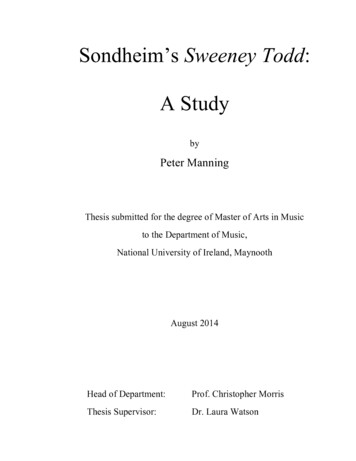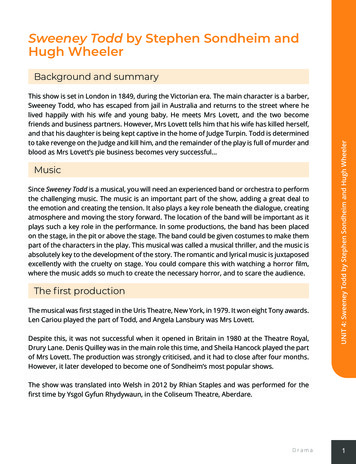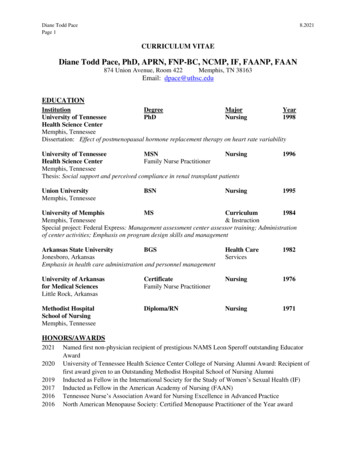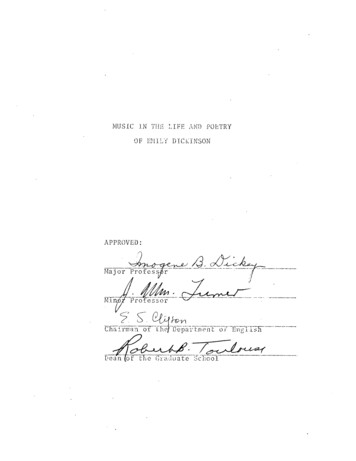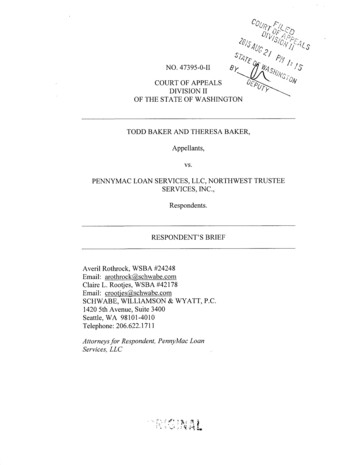
Transcription
NO. 47395 -0 -IIB}COURT OF APPEALSDIVISION IIOF THE STATE OF WASHINGTONTODD BAKER AND THERESA BAKER,Appellants,vs.PENNYMAC LOAN SERVICES, LLC, NORTHWEST TRUSTEESERVICES, INC.,Respondents.RESPONDENT' S BRIEFAveril Rothrock, WSBA #24248Email:arothrock@schwabe. comClaire L. Rootjes, WSBA #42178Email: crootjes @schwabe. comSCHWABE, WILLIAMSON & WYATT, P. C.1420 5th Avenue, Suite 3400Seattle, WA 98101 -4010Telephone: 206. 622. 1711Attorneys for Respondent, PennyMac LoanServices, LLC
I.INTRODUCTION1II.STATEMENT OF THE ISSUES2III.COUNTER STATEMENT OF THE CASE3IV.STANDARDS OF REVIEW5V.ARGUMENT6A.The Bakers are not entitled to relief under WASH. R.Civ. P. 60( b)( 6) because the judgment does nothaveB.prospective application.6The Bakers are not entitled to relief under WASH. R.Civ. P. 60( b)( 11) because issuance of the Jesinoskidecision does not constitute extraordinary9circumstances.1.Washington courts do not allow relief fromjudgment after a change in law absentextraordinary2.circumstances.Cases under the USFSPA presentextraordinary circumstances not presenthere3.11Federal courts have similarly requiredextraordinary circumstances before findingthatC.10a changein lawwarrants relief.13The Bakers' assertion that PennyMac is not theproper party in interest does not qualify as anextraordinary circumstance warranting relief fromthe1.21judgmentPennyMac' s status as loan servicer wasknown to the Bakers when they filed theirComplaint2.21PennyMac is a real party in interest becausethe Bakers' claims related to PennyMac' spurportedwrongdoing22
D.Interests of finality support affirmance of the trialcourt' sE.of relieffrom the judgment.23Equitable concerns support affirmance of the trialcourt' sVI.denialdenialCONCLUSIONof relieffrom the judgment.2425
TABLE OF AUTHORITIESCasesAgostini v. Felton,521 U. S. 203, 117 S. Ct. 1997, 138 L. Ed. 2d 39181997)Bailey v. Ryan Stevedoring Co.,894 F. 2d 157 ( 5th Cir. 1990)14Batts v. Tow -Motor Forklift Co.,66 F. 3d 743 ( 5th Cir. 1995)20Bjurstrom v. Campbell,27 Wn.App.449, 618 P. 2d 533 ( 1980)22Blue Diamond Coal Co. v. Trustees of the UMWACombined Benefit Fund,249 F. 3d 519 ( 6th Cir. 2001)14, 15Chelan Cy. Deputy Sheriff's Ass 'n v. Chelan Cy.,109 Wn.2d 282, 745 P. 2d 1 ( 1987)7Columbia Rentals, Inc. v. Washington,89 Wn.2d 819, 576 P. 2d 62 ( 1978)passimIn re Fine Paper Antitrust Litigation,840 F. 2d 188 ( 3d Cir. 1988)20U.S. ex rel. Garibaldi v. Orleans Parish School Bd.,397 F. 3d 334 ( 5th Cir. 2005)Genie Indus., Inc. v. Mkt. Transp., Ltd.,138 Wn. App. 694, 158 P. 3d 1217 ( 2007)Ghebrehriorghis v. Dep' t ofLabor,92 Wn. App. 567, 962 P. 2d 829 ( 1998)13239, 22Gibbs v. Maxwell House,738 F. 2d 1153 ( 11th Cir. 1984)7
Gonzelez v. Crosby,545 U. S. 524, 125 S. Ct. 2641, 162 L. Ed. 2d 48018, 202005)Gustafson v. Gustafson,54 Wn.App.66, 772 P. 2d 1031 ( 1989)6Horne v. Flores,557 U. S. 433, 129 S. Ct. 2579, 174 L. Ed. 2d 40682009)Jarrow Formulas, Inc. v. Nutrition Now, Inc.,25304 F. 3d 829 ( 9th Cir. 2002)Jesinoski v. Countrywide Home Loans, Inc.,135 S. Ct. 790, 190 L. Ed. 2d 650 ( 2015)U. S. ,passimLindgren v. Lindgren,58 Wn.App.588, 794 P. 2d 526 ( 1990)6Lopez v. Ryan,17678 F. 3d 1131 ( 9th Cir. 2012)Lynnv.Labor & Indust.,130 Wn.App.829, 125 P. 3d 202 ( 2005)10Maraziti v. Thorpe,7, 852 F. 3d 252 ( 9th Cir. 1995)In re Marriage ofBrown,98 Wn. 2d 46, 653 P. 2d 602 ( 1982)In re the Marriage ofFlannagan,42 Wn. App. 214, 709 P. 2d 1247 ( 1985)In re Marriage ofFurrow,115 Wn. App. 661, 63 P. 3d10, 2312, 13821 ( 2003)9In re Marriage of Giroux,41 Wn. App. 315, 704P. 2d 160 ( 1985)11In re Marriage of Tang,57 Wn. App. 656, 789P. 2d 118 ( 1990)9iv -
Mc 'Omie -Gray v. Bank ofAm. Home Loans,667 F.3d 1325 ( 9th Cir. 2003)17, 20Nelson v. Spanaway Gen. Med. Clinic,24135 Wn. 2d 255, 956 P. 2d 312 ( 1998)Pac. Tel. & Tel. Co. v. Henneford,10199 Wash. 462, 92 P. 2d 214 ( 1939)Phelps v. Alameda,569 F. 3d 1120 ( 9th Cir. 2009)passimRitter v. Smith,17811 F. 2d 1398 ( 11th Cir. 1987)Rugo v. Inmates of Suffolk County Jail,502 U. S. 367, 112 S. Ct. 748, 116 L. Ed. 2d 867 ( 1992)8Title v. United States,14263 F. 2d 28 ( 9th Cir. 1959)Vance v. Thurston County Comm 'rs,117 Wn. App. 660, 71 P. 3d 680 ( 2003)21Weeks v. Chiefof Wash. State Patrol,796 Wn. 2d 893, 639 P. 2d 732 ( 1982)StatutesTruth -In- Lending Act, 15 U. S. C. §1601etseq19Uniformed Services Former Spouses Protection Act, 10U. S. C. §1408et11, 12, 13, 26seq.Washington' s Consumer Protection Act, RCW 19. 86 et3seqOther Authorities7, 14FED. R. Civ. P. 6024RAP 2. 2WASH. R. Civ. P. 60( b)passimv-
I.INTRODUCTIONThe Bakers failed to establish their right to relief from judgmentunderWASH. R. C iv. P. 60( b).changein law, such as theIt is well established that a subsequentSupreme Court decision in Jesinoski v.Countrywide Home Loans, Inc., is not enough to allow relief from a finaljudgment. The Final Order and Judgment in this case did not haveprospective application and thus did not implicate relief under WASH. R.Civ. P. 60( b)( 6).The Bakers further failed to establish extraordinary circumstanceswarrantingrelieffrom judgmentunderWASH.R. Civ. P.60( b)( 11),beyond the mere fact of the Supreme Court' s decision in Jesinoski. Theresolution of a circuit split is an ordinary occurrence that will not sufficeto reopen the floodgates of concluded and final litigation. The Bakersfailed to act with diligence in pursuing their claims, as they did not seekappeal or reconsideration of the adverse ruling. That PennyMac is theservicer of the loan does not warrant relief from judgment when thosefacts were known to the Bakers at the pleading and summary judgmentstage of the concluded litigation. No abuse of discretion is shown. To thecontrary, interests of finality and equity weigh in favor of affirming thedenial of the Bakers' motion, even more so now that the foreclosure salehas beencompletedandthe Bakersare nolonger inpossession oftheir
home. Washington and federal precedent supports affirmance in thesecircumstances.II.The1.doesSTATEMENT OF THE ISSUESstandardforrelief underapply to judgments that donotnotWASH. R. Chave "iv.prospectiveP.60( b)( 6)application."Was denial of the Bakers' request for WASH. R. Civ. P. 60( b)( 6) reliefwithin the sound exercise of the trial court' s discretion where the FinalOrder and Judgment against the Bakers has no prospective application?Yes.2.Civ. P.A subsequent change in law does not warrant WASH. R.60( b)( 11)relief where there are no additional extraordinarycircumstances present. Was denial of the Bakers' request for WASH. R.Civ. P.60( b)( 11)relief within the sound exercise of the trial court' sdiscretion where the only reason supporting relief was the SupremeCourt' s Jesinoski decision? Yes.3.Is PennyMac' s position as loan servicer insufficient toqualify as an extraordinary circumstance warranting WASH. R. Civ. P.60( b) relief where this information was known to the Bakers at the time ofpleading their Complaint and on summary judgment, and the Bakersneither advanced their argument nor appealed the adverse ruling? Yes.4.Do interests of finality and equity support the denial of the2
Bakers' motion for relief where the property has been sold to a third -partypurchaser and the Bakers are no longer in possession? Yes.COUNTER STATEMENT OF THE CASEIII.ToddagainstTheresa Baker ( the " Bakers ") filed suit April 8, 2011andPennyMac Loan Services, LLC ( " PennyMac ") and NorthwestTrustee Services, Inc. ( " Northwest Trustee ")preventforeclosureoftheir property. ( CPseeking an injunction to130 -43).They also allegedcauses of action for rescission of their loan, breach of the duty of goodfaithandfairdealing,violationsandofWashington' sConsumerProtection Act. Id. Although the Bakers had sent their rescission notice focusedonPennyMac' s purported wrongdoing and alleged that PennyMac " refused toacknowledge3. 21).therescissionorthevoidedstatusofthenote." (CP 136,The Bakers' Complaint also alleged that PennyMac was not theloan,beneficiaryofforeclosure,nor appoint atheirand "asaservicer,it cannot prosecute atrustee." ( CP 140, ¶ 3. 46).PennyMac and Northwest Trustee both moved for SummaryJudgment. The trial court issued a ruling by letter on November 27, 2012in which it rejected the Bakers' claims on multiple grounds including atime -bar, holding:With respect to the rescission claim, the court concludes Plaintiffs'claim is time -barred for failure to file suit within three years of3
loan consummation. Additionally, Plaintiffs have failed to identifyfacts or disputed facts which would establish their claim, and failedto establish they could tender the proceeds of the loan. As to thesecond and third causes of action, as Plaintiffs did not seek judicialenforcement of the rescission of their loan transaction within threeyears, PennyMac had a legal right to compel performance andcould not be held to have breached [ sic] the duty of good faith andfair dealing by asserting a right it legally held.CP 6 -7).The court also awarded PennyMac its fees and costs incurred indefending against the Bakers' lawsuit, and released funds being held in thecourtregistry to PennyMac. ( CP 8 -9). A Final Order and Judgment wasentered on December 21, 2012. Id.The Bakers did not move for reconsideration, nor for relief underWASH. R. Civ. P. 60. The Bakers did not appeal the adverse ruling.Years later in February 2015, the Bakers filed a Motion for Relieffrom Judgment under CR 60( b) against PennyMac and Northwest Trustee.CP 98 -114). In their motion, the Bakers alleged that the more than two -year -old final judgment should be reopened due to a subsequent change inlawunderJesinoskiv.Countrywide Home Loans, Inc.,Ct. 790, 190 L. Ed. 2d 650 ( 2015).U. S. ,135 S.In Jesinoski, the U. S. Supreme Courtheld that a borrower need only send a notice of rescission within the three year statute of limitations, not commence a lawsuit.The trial court promptly heard oral argument on the ty. ( CP 156, 157). OnMarch 10, 2015, the trial court issued a letter ruling and order denying the4
the Motion for Relief') ( CP 160).Bakers' CR 60motion ( "OrderThe trialheld that " subsequent change in law does not provide thecourtDenyingbasis for relief from a final judgment in the absence of extraordinarycircumstances.It is my conclusion Plaintiffs have not ieffrom the judgment." Id.The Bakers did not seek a stay to preserve the status quo pendingappeal of denial of the CR 60 motion. The nonjudicial foreclosure sale onthe Bakers'Appellant'Declarationproperty tooksofBrief')at9.place1June 26, 2015. Appellant' s BriefonThe property was sold to a third party. SeeClaire Rootjes, Exh. A.2The Bakers appeal the denial, arguing that the trial court abused itsdiscretion. Because the trial court' s determination was supported by thelaw and the evidence, this Court should affirm.IV.STANDARDS OF REVIEWPennyMac agrees with the Bakers that the standard of review onappeal is abuse of discretion. Appellant' s Brief, at 4 ( citing Lindgren v.Lindgren,158Wn.App.588,595,794P. 2d526 ( 1990));seealsoIn some parts of their brief, the Bakers assert that the nonjudicialforeclosure is still pending, but they directly acknowledge at page 9 thatthe nonjudicial foreclosure sale occurred June 26, 2015.2PennyMac has filed a Motion to Submit New Evidence in order tointroduce the document attached to Exhibit A, and includes the citation tothis evidence contingent upon that motion being granted.5
Gustafsonv.explainingabuseGustafson, 54 Wn.reviewofdiscretion). "ofdecisionApp.under66, 69, 772 P. 2d 1031 ( 1989)CR 60( b)( 6)and60( b)( 11)is forIf the discretionary judgment of the trial court isbased upon tenable grounds and is within the bounds of reasonableness, itmustbeupheld."Lindgren, 58 Wn. App. at 595 ( citing generally Cogglev. Snow, 56 Wn. App. 499, 507, 784 P. 2d 554 ( 1990)).Applying these standards, this Court should affirm.V.ARGUMENTThe Bakers moved for relief from the judgment under WASH. R.Civ. P. 60( b)( 6)and60( b)( 1 1).The trial court properly denied relief underboth provisions.A.The Bakers are not entitled to relief underWASH. R. Civ. P. 60( b)( 6) because the judgmentdoes not have prospective application.This Court should affirm the trial court' s denial of relief underWASH. R. Civ. P. 60( b)( 6), which provides that a court may grant relieffromajudgmentif the " judgment hasbeensatisfied,released,ordischarged, or a prior judgment upon which it is based has been reversedor otherwise vacated, or it is no longer equitable that the judgment shouldhaveprospectiveadded).application."WASH.R. Civ. P.60( b)( 6) (emphasisThe Bakers rely on this last section and argue that changedcircumstances warrant relief in this case. This provision does not apply6
because the judgment does not have " prospective application."No Washington court has explicitly considered the meaning of thelanguage "lengthprospective application,"analogousbut federal courts have considered atlanguage in FED. R. Civ. P. 60( b)( 5).When construingsimilar court rules, Washington courts often look to federal decisions aspersuasive authority. See Chelan Cy. Deputy Sheriff's Ass' n v. ChelanCy.,109 Wn. 2d 282, 291, 745 P. 2d 1 (1987);Weeks v. Chief of Wash.State Patrol, 96 Wn.2d 893, 897, 639 P. 2d 732 ( 1982).CourtofAppeals has persuasivelyapplication,"changingexplained3The Ninth Circuitthat to have "prospectivethe judgment must be " executory" or involve " supervision ofconduct,"as follows:Virtually every court order causes at least some reverberations veThat a court' s action has continuing consequences,effect .however,anddoesapplication"notfor thenecessarilypurposes ofmeanthatit has "Rule 60( b)( 5).prospectiveThe standard usedin determining whether a judgment has prospective application iswhether it is executory' or involves the supervision of changingconduct or conditions[.] "'Marazitiv.Thorpe, 52 F. 3d 252, 254 ( 9th Cir. 1995); see also Gibbs v.Maxwell House, 738 F. 2d 1153, 1155 -56 ( 11th Cir. 1984) ( " That plaintiffremains bound by the dismissal is not a prospective effect' within themeaning of rule 60( b)( 5) any more than if plaintiff were continuing to feel3 The Bakers agree that review of case law under the analogous federalrule is appropriate. Appellant' s Brief, at 12.7
the effects of a money judgment against him. ").The Bakers argue that the trial court' s judgment dismissing theirclaims has " prospective application" because it " affects the Bakers' rightsrelating to the ongoing foreclosure proceedings, such as a suit to challengeanillegal foreclosure." Appellant' s Brief, at 11. The construction soughtby the Bakers has been rejected because the construction " apparently is tothe effect that a judgment has prospective effect so long as the parties areboundbyit,thewould readword prospective'out oftherule."Maraziti,52 F. 3d at 254 ( quoting Schwartz v. United States, 976 F. 2d 213, 218 ( 4thCir. 1992)).The judgment is no more prospective than any other judgmentdismissing a claim or awarding a money judgment.While the Bakers are correct that the Supreme Court has held thatchanged circumstances" may warrant relief under the provision, the partyseeking relief must first establish the threshold requirement that thejudgment isthe statuteprospective,even applies.i. e., that the " prospective application" portion of4 The Bakers cannot do so here. WASH. R. Civ. P.60( b)( 6) does not apply because the judgment in this case does not have4 Each of the Supreme Court cases cited by the Bakers dealt withprospective relief. Horne v. Flores, 557 U. S. 433, 129 S. Ct. 2579, 174 L.Ed. 2d 406 ( 2009);Rugo v. Inmates ofSuffolk County Jail, 502 U.S. 367,384, 112 S. Ct. 748, 116 L. Ed. 2d 867 ( 1992); Agostini v. Felton, 521U. S. 203, 117 S. Ct. 1997, 138 L. Ed. 2d 391 ( 1997) (injunction).8permanent
prospective application.The Bakers are not entitled to relief underWASH. R. Crv. P. 60( b)( 11) because issuance ofthe Jesinoski decision does not constituteB.extraordinary ngR. Civ. P.involveWn.also was proper underauthorizesrelief."60( b)( 11)relianceApp. 656,judgment to bevacated "a catch-for any otherThis subsection is limited in application. WASH.operatesmistakenonaWASH. R. Civ. P. 60( b)( 11),in " unusual situations which typicallyinformation."789 P. 2d 118 ( 1990) (In re Marriage of Tang, 57citing In re Adoption of Henderson,97 Wn.2d 356, 359 -60, 644 P. 2d 1178 ( 1982)).Irregularities that areextraneous to the court' s action or that involve substantial deviations froma proscribed rule or mode of proceeding justify vacation under WASH. R.C[ v. P. 60( b)( 11),115 Wn.whereas errors of law do not. In re Marriage ofFurrow,App. 661,674, 63 P. 3d 821 ( 2003). Errors of law must be raiseddirectly on appeal. Ghebrehriorghis v. Dep' t of Labor, 92 Wn. App. 567,962 P. 2d 829 ( 1998).extraordinaryA subsequent change in the law, with no additionalcircumstances,doesnotsupport relief.Columbia Rentals,Inc. v. Washington, 89 Wn.2d 819, 576 P. 2d 62 ( 1978).The Bakers failed to appeal the alleged error of law regarding thetrialcourt' s application ofnot support collateralthe time -bar.WASH. R. Civ. P. 60( b)( 11) doesattack years later based on an error of law9
establishedthrougha changein the law. The Bakers cannot show that thetrial court abused its discretion when it denied CR 60( b)( 11) relief.1.Washington courts do not allow relief fromjudgment after a change in law absentextraordinary circumstances.Washington courts have rejected parties' attempts to utilize WASH.R. Civ. P. 60( b)( 11) as a means to reverse a judgment due to a subsequentchange in the law where additional extraordinary circumstances were notpresent.Pac. Tel. &1939); InLynnv.reTel. Co. v. Henneford, 199 Wash. 462, 92 P. 2d 214Marriage of Brown, 98 Wn. 2d 46, 653 P. 2d 602 ( 1982);Labor & Indust.,130 Wn. App. 829, 837, 125 P. 3d 202 ( 2005).In Columbia Rentals, Inc.v.Washington, theSupreme Courtconsidered whether to reopen a number of quiet title actions based on aWashington Supreme Court case that had been reversed by the UnitedStates Supreme Court. 89 Wn.2d 819. The varying rules of law betweenthe overruled Washington decision and the Supreme Court decisioncreateda "checkerboardpatternof [property]ownership."Id. at 820.Despite this disparate result, the Washington Supreme Court refused toalterthe judgmentsbased inthechangein the law. " If prior judgmentscould be modified to conform with subsequent changesinterpretations,we might never see10-theend ofin judiciallitigation." Id. at 823.
2.Cases under the USFSPA presentextraordinary circumstances not presenthere.Washington courts have found extraordinary circumstances underWASH. R. Civ. P. 60( b)( 11) arising froma change of one uniquelaw —theUniformed Services Former Spouses Protection Act ( " USFSPA "). Thecases cited by the Bakers for the proposition that a change in law warrantsrelief from judgment are cases under this statutory scheme. Appellant' sBrief,12 - mstances that are not present in this case.Prior to1981,it was established in Washington that militarypensions were community property that could be divided upon dissolutionof the marriage. In re Marriage of Giroux, 41 Wn. App. 315, 318, 704P. 2d160 ( 1985). In 1981, the United States Supreme Court issued adecision in McCarty v. McCarty, holding that federal law prohibited statecourts from dividing military retirement pay pursuant to communityproperty laws. Id. at 317. Soon after, in direct response to McCarty, thePresident signed the USFSPA, which " permits state courts to treat June25,1981,ascommunityId. Congress specifically intended the statute to be retroactivelyapplied. Id. at 318 he
provisions of the USFSPA retroactively to benefit those individuals whosecases were decided in the interim period between McCarty and theenactment of the USFSPA, this Court utilized WASH. R. Civ. P. 60( b)( 11)to provide those spouses relief from judgment. In re the Marriage of42Flannagan,Wn.214,App.709P. 2d1247 ( 1985).EvenwithCongress' s clear direction, this Court stepped carefully before holding thatWASH. R. Civ. P. 60( b)( 11) applied. Division II found that the cases afterthe adoption of thethatcircumstancesUSFSPA presented notocombinedshowless than four unusualextraordinarycircumstances,asfollows:First, the clear congressional desire of removing all ill effects ofMcCarty; second, the alacrity with which the Congress moved inpassing the USFSPA; third, the anomaly of allowing division ofthe military retirement pay before McCarty and after USFSPA, butnot during the 20 -month period in between; and fourth, the limitednumber of decrees that were final and not appealed during ardDuetotheseextraordinarybut the decision "emphasize[circumstances,reliefwasd] the limited nature of thisAllowing reopening in these cases will not provide aforattacks on all otherfinal judgments." Id.The extraordinary circumstances presented in the cases under theUSFSPA are not present here. In fact, this case can be categorized as a-millrun -of the-requestforrelieffrom judgment.12 -While the USFSPA
cases presented clear Congressional direction dictating a retroactiveapplication of the law, there are no similar directions under the Jesinoskicase. That case is a resolution of a circuit split, which does not presentextraordinary circumstances. See U.S. ex rel. Garibaldi v. Orleans ParishIn Garibaldi the Fifth CircuitSchool Bd., 397 F. 3d 334 ( 5th Cir. 2005).notedthat "[a] fter almost every resolution of a circuit conflict there is alosing litigant somewhere who could argue similarly for reopening hiscase because it was decided erroneously in light of the subsequentSupreme Court decision."Id. at 338. The Fifth Circuit concluded thatthe common situation of a resolution of a circuit conflict, without anythingmore exceptional, does warrant relief. Id.Marriage of Flannagan and Garibaldi support the trial court' sconclusionPlaintiffsthat traordinaryfrom the judgment." ( CP 160). The trialcourt did not abuse its discretion and the Order Denying the Motion forRelief should be affirmed.Federal courts have similarly requiredextraordinary circumstances before finding3.that a change in law warrants relief.Numerous federal courts have similarly refused to apply FED. R.Civ. P.Rules,60( b)( 6),whentherethe analogous catch -all provision under the Federalisa subsequent change13 -in law. " It is well established
thatain decisional law ischangecircumstance'meriting Rule 60( b)( 6)not,byrelief."itself,an extraordinaryBlue Diamond Coal Co. v.Trustees of the UMWA Combined Benefit Fund, 249 F. 3d 519, 524 ( 6thCir. 2001);1990) ( "[Baileyv.RyanStevedoringCo., 894 F. 2d 157, 160 ( 5th Cir.a] change in decisional law after entry of judgment does notconstitute exceptional circumstances and is not alone grounds for relieffrom a final judgment. ").For instance, in the case Title v. United States, the citizenship ofthe appellant was revoked, despite the fact that the United States hadfailed to file an affidavit of good cause with its Complaint in thedenaturalizationproceeding.263F. 2d28 ( 9thCir.1959).Whenasubsequent United States Supreme Court decision came down, indicatingthat the affidavit was a procedural prerequisite to a denaturalization suit,the appellant sought relief from the judgment under FED. R. Civ. P. 60.The Ninth Circuit Court of Appeals affirmed the district court' s denial ofhismotion. "Rule 60( b) was not intended to provide relief for error on thepart of the court or to afford a substitute for appeal. Nor is a change in thejudicial view of applicable law after a final judgment sufficient basis forvacatingsuch ajudgmententeredbeforeannouncement ofthechange."Id.at 31. The Court made this determination despite the seriousness of theissue at stake in that case: an individual' s right to citizenship. Many other14 -
federal courts have reached similar determinations and have rejectedtoattemptsreopenjudgments due toa subsequent changein law,5evenwhere a law was invalidated on constitutional grounds. See Blue Diamond,249 F. 3dat524 ( citing Battsv.Tow -Motor Forklift Co., 66 F. 3d 743, 748-49 ( 5th Cir. 1995) ( " Changes in decisional law based on constitutionalprinciples are not of themselves extraordinary circumstances sufficient tojustifyRule 60( b)( 6)relief. ");838 -39 ( 2d Cir. 1958) (Collins v. City of Wichita, 254 F. 2d 837,holding invalidation by the United States SupremeCourt of Kansas statute that was basis of previous final judgmentinsufficient toestablish "extraordinarycircumstances"tomerit Rule60( b)( 6) relief)).The Bakers admit that in order to be entitled to relief, the resented "extraordinaryin addition to a change in decisional law. Appellant' sBrief, at 14. They argue that the following facts constitute " extraordinarycircumstances"warranting relief under the Ninth Circuit case Phelps v.Alameda, 569 F. 3d 1120 ( 9th Cir. 2009): ( 1) the facts of.7esinoski and the5See Blue Diamond, 249 F. 3d at 524 ( citing Agostini v. Felton, 521 U. S.203, 239, 138 L. Ed. 2d 391, 117 S. Ct. 1997 ( 1997) ( " Interveningdevelopments in the law by themselves rarely constitute the extraordinarycircumstances requiredIns. Co.v.Cir. 1997);forrelief underRule 60( b)( 6) . ");CincinnatiFlanders Elec. Motor Serv., Inc., 131 F. 3d 625, 628 -29 ( 7thTravelers Indemnity Co. v. Sarkisian, 794 F. 2d 754, 757 ( 2dCir. 1986); Berryhill v. United States, 199 F. 2d 217, 219 ( 6th Cir. 1952)).15 -
Bakers'afterwhencase are similar; (Jesinoskitheclarified.was2) the Bakers did not delay in bringing their suitdecided; ( 3) the parties are in the same position asjudgmentwas entered; and (Appellant'sBrief,at14 -15.4) the lawwas not " changed,"This is wrong.butThe comparison tothe facts of Phelps does not hold up.In Phelps v. Alameda, the Ninth Circuit examined six factors todetermine if extraordinary circumstances warranting Rule 60( b)( 6) reliefwere present.1)natureofPhelps, 569 F. 3dtheinterveningatchangediligence in pursuing the issuewhetherofintereststhe judgmentconnectionofandfinalitythebetween the1137 -40.aremotion6The factors were as follows:in law; ( 2) petitioner' s exercise ofduringthe underlyingimplicated; (3)4) delay between the finalityfor Rule 60( b)( 6)cases; and (proceedings; (6) interestsofrelief; (5)the degree ofcomity. Id.Applying these factors to the instant case reveals that relief fromjudgment is not warranted. Taking the factors out of order, the Bakers firstargue regarding the fifth factor that relief is warranted because the facts oftheir case and Jesinoski are similar. But the Phelps court did not considersimilarity of fact patterns, looking instead at the connection between the6 The court cautioned that these rules should not be taken as an exhaustiveor mechanical list of considerations. 569 F. 3d at 1141.7 This last primarily concerns habeas corpus actions, like in Phelps.Phelps, 569 F. 3d at 1139 -40.16 -
case relied upon for the original decision, and the case overturning, orclarifying, it. In this case, the Court would look at the connection betweenMc' Omie -Grayv.Bank of Am. Home Loans, 667 F. 3d 1325 ( 9th Cir.2003), the case relied upon for the original decision, and Jesinoski. InPhelps, the court noted that the " the intervening change in the law directlyoverruledLopezv.thedecision forwhichreconsideration [had been]sought."Ryan, 678 F. 3d 1131 ( 9th Cir. 2012) ( citing Phelps). No similarconnection is present here because neither the Bakers' case nor Mc' Omie-Graywere reviewed or referencedin any wayJesinoski.bySmith, 811 F. 2d 1398, 1402 ( 11th Cir. 1987) ( casesSee Ritter v.closely related becausethe Supreme Court granted certiorari in the Ex Parte Baldwin case, 456So. 2d 129 ( Ala. 1984),for the express purpose of resolving the disputebetween Ritter and Baldwin).Next, addressing the second Phelps factor, the Bakers point outthat they quickly filed their motion after Jesinoski was decided.Appellant' s Brief, at 15. This is not the type of diligence considered by thePhelps court. The Phelps court looked at the degree of diligence thepetitioner used in pursuing the issue in the underlying proceeding. Id. at1136. In this case, the Bakers were not diligent. After the trial courtgranted PennyMac' s motion for summary judgment, the Bakers did notfilea motionforreconsideration and17 -didnotfilean appeal. (CP 117). See
Gonzelez v. Crosby, 545 U. S. 524, 535, 125 S. Ct. 2641, 162 L. Ed. 2d 4802005) (explaining that the petitioner' s failure to appeal or seek rehearingand point out the circuit split demonstrated a lack of diligence lief).The Phelps court alsoconsidered the length of time between the final decision and the CR 60motion. In the case at bar, the two year length of time is significant,weighing8against relief.Addressingthethird Phelpsfactor, the Bakers claim that theinterests of finality will not be implicated if the court grants relief underWASH. R. Civ. P. 60, because they are still in possession of their property.Appellant' s Brief, at 15. This is untrue, and perhaps the result of a failureto update their brief after the foreclosure sale occurred. The Bakers admitthat the property was sold in a trustee' s sale on June 25, 2015. Appellant' sBrief,atpurchaser.9.The property is now in the possession of a third -partyRootjes Decl.,Exh. A. Interests of finality instead are criticalhere and warrant protection of the interests of PennyMac, NorthwestTrustee, and t
against PennyMac Loan Services, LLC ( "PennyMac ") and Northwest Trustee Services, Inc. ( " Northwest Trustee ") seeking an injunction to prevent foreclosure of their property. ( CP 130 -43). They also alleged causes of action for rescission of their loan, breach of the duty of good faith and fair dealing, and violations of Washington' s Consumer
